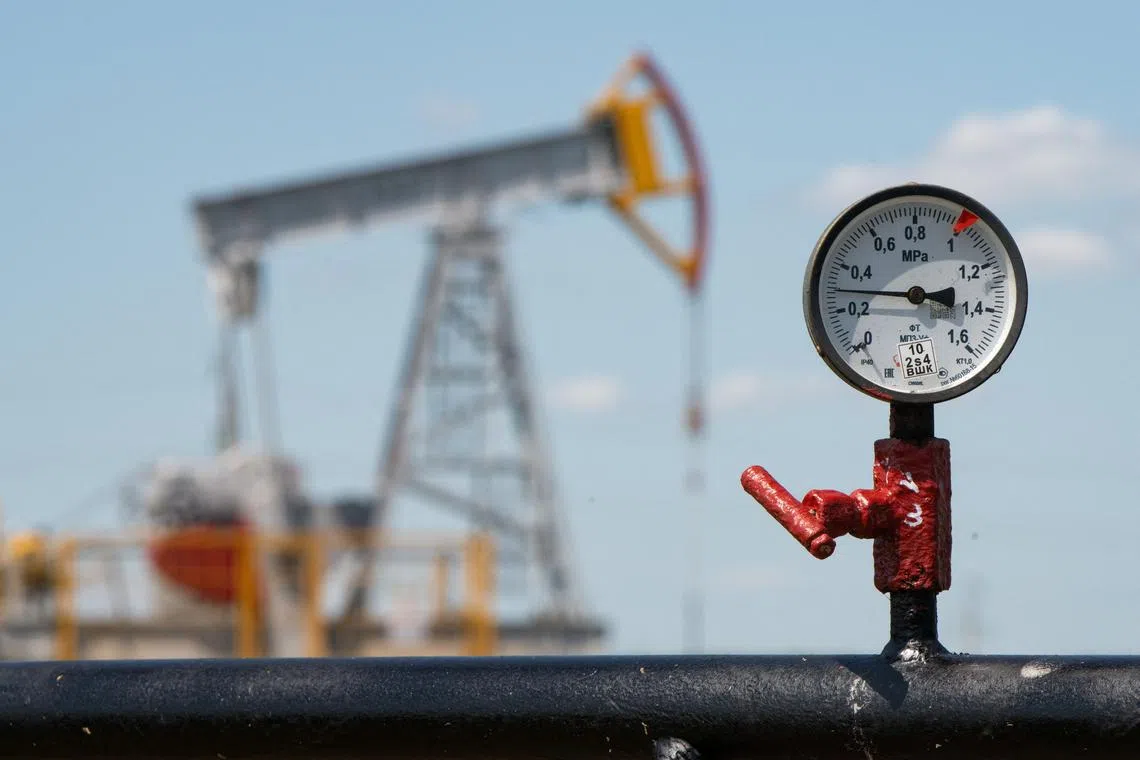India to maintain Russian oil imports despite Trump threats, government sources say
Sign up now: Get ST's newsletters delivered to your inbox

US President Donald Trump has threatened 100 per cent tariffs on US imports from countries that buy Russian oil unless Moscow reaches a peace deal with Ukraine.
PHOTO: REUTERS
Follow topic:
- India will continue to purchase oil from Russia, despite threats of penalties from US President Trump, citing long-term contracts.
- India defends its Russian oil imports, noting they help avoid global price surges, and are below the EU price cap, not subject to direct sanctions.
- While the government maintains its partnership, state refiners have paused Russian oil purchases due to reduced discounts and EU sanctions on Nayara Energy.
AI generated
NEW DELHI – India will keep purchasing oil from Russia despite US President Donald Trump’s threats of penalties, two Indian government sources told Reuters on Aug 2, not wishing to be identified due to the sensitivity of the matter.
On top of a new 25 per cent tariff on India’s exports to the US, Mr Trump indicated in a Truth Social post in July that India would face additional penalties for purchases of Russian arms and oil.
On Aug 1, Mr Trump told reporters he had heard that India would no longer be buying oil from Russia.
But the sources said there would be no immediate changes.
“These are long-term oil contracts,” one of the sources said. “It is not so simple to just stop buying overnight.”
Justifying India’s oil purchases from Russia, a second source said India’s imports of Russian grades had helped avoid a global surge in oil prices, which have remained subdued despite Western curbs on the Russian oil sector.
Unlike Iranian and Venezuelan oil, Russian crude is not subject to direct sanctions, and India is buying it below the current price cap fixed by the European Union, the source said.
The New York Times also quoted two unnamed senior Indian officials on Aug 2 as saying there had been no change in Indian government policy.
The Indian government authorities did not respond to Reuters’ request for official comment on its oil purchasing intentions.
However, during a regular press briefing on Aug 1, foreign ministry spokesman Randhir Jaiswal said India has a “steady and time-tested partnership” with Russia.
“On our energy sourcing requirements... we look at what is there available in the markets, what is there on offer, and also what is the prevailing global situation or circumstances,” he said.
The White House did not immediately respond to requests for comment.
India’s top supplier
Mr Trump, who has made ending Russia’s war in Ukraine a priority of his administration since returning to office in 2025, has expressed growing impatience with Russian President Vladimir Putin in recent weeks.
He has threatened 100 per cent tariffs on US imports from countries that buy Russian oil unless Moscow reaches a peace deal with Ukraine.
Russia is the leading supplier to India, the world’s third-largest oil importer and consumer, accounting for about 35 per cent of its overall supplies.
India imported about 1.75 million barrels per day of Russian oil from January to June in 2025, up 1 per cent from a year ago, according to data provided to Reuters by sources.
But while the Indian government may not be deterred by Mr Trump’s threats, sources told Reuters this week that Indian state refiners stopped buying Russian oil after July discounts narrowed to their lowest since 2022 – when sanctions were first imposed on Moscow – due to lower Russian exports and steady demand.
Indian Oil, Hindustan Petroleum, Bharat Petroleum and Mangalore Refinery And Petrochemical have not sought Russian crude in the past week or so, four sources told Reuters.
Nayara Energy – a refinery majority-owned by Russian entities, including oil major Rosneft, and major buyer of Russian oil – was recently sanctioned by the EU.
Nayara’s chief executive resigned following the sanctions, and three vessels laden with oil products from Nayara Energy have yet to discharge their cargoes, hindered by the new EU sanctions, Reuters reported last week. REUTERS

